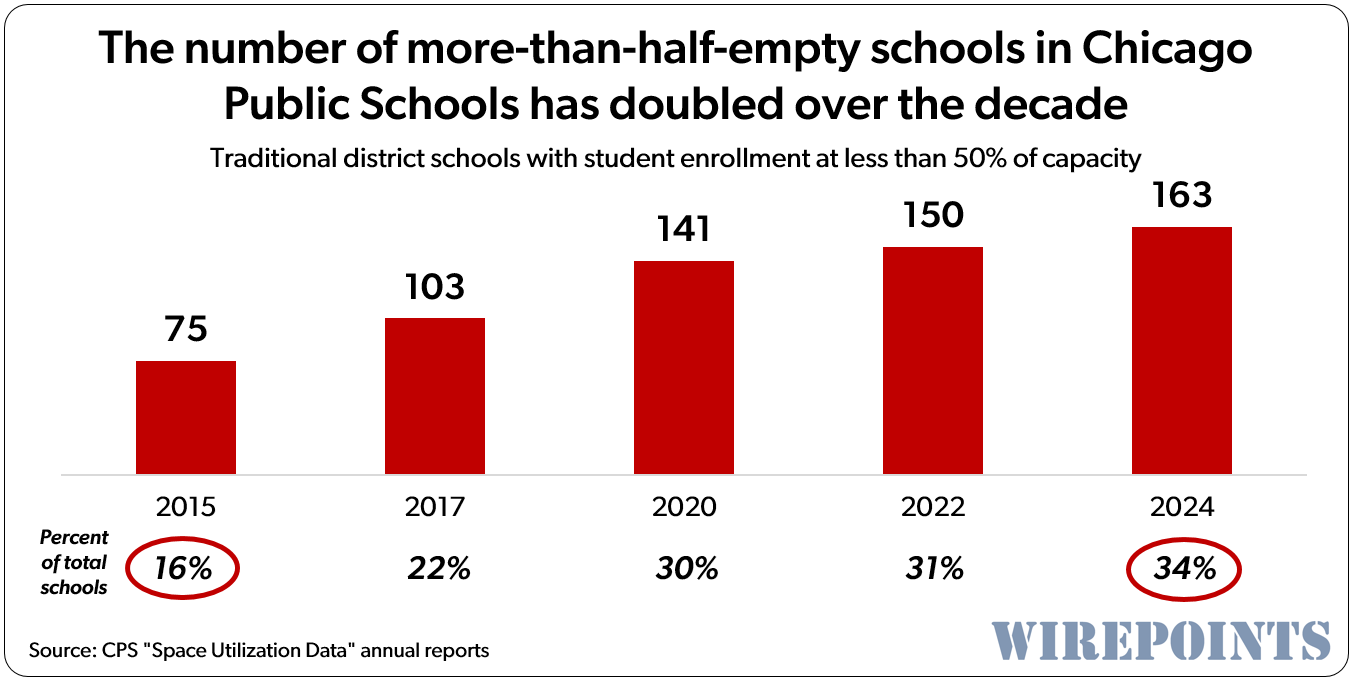By: Ted Dabrowski and Mark Glennon
Let’s start with the good because it’s short. Mayor Rahm Emanuel’s grand plan for fixing Chicago’s pensions, released December 12, included a call to amend the pension protection clause in Illinois’ constitution. He accompanied that call with harsh criticism of the automatic 3% COLA that inflated two of Chicago’s four pensions – a benefit currently protected by the clause.
His words, even if they come to nothing in the near term, are meaningful in the long run. It’s the first time any major Democratic officeholder has acknowledged two conflicting realities about Illinois’ pension system: pension benefits already granted are unaffordable, and yet there is a constitutional clause that says they nevertheless must be paid.
Someday, after Illinois has sunk much further into the abyss, the impossibility of the coexistence of those two facts will be accepted as obvious. Rahm’s comments, hopefully, will make that day come sooner.
Other than that, Emanuel’s proposal is a litany of wrongs, many of which are the very ones that created the fiscal crisis that has crippled Illinois, Chicago and most of its municipalities:
1. More generational theft. The central feature of Emanuel’s $10 billion borrowing plan is a $7.7 billion POB, or pension obligation bond. The money borrowed through the bond offering would be given to city pensions, lowering their unfunded liability but increasing the city’s debt by an equal amount. The increased pension health would be an illusion – Chicago taxpayers would be no better off because the bond merely swaps one form of debt for another.
What’s worse is for Emanuel’s plan to work, the repayment of the bonds extends far into 2055, pushing the burden onto Chicago’s future generations.
Read more about why POBs fix nothing: Chicago’s pension bond scheme
2. Another asset sale. Actually, Chicagoans would be worse off because the POB would be created through yet another “securitized” loan – a sale of the city’s financial body parts. Because Chicago’s credit is so poor, bond buyers are now requiring more from the city to make deals work. That’s where the new securitization scheme comes in – where the city sells full ownership of city assets over to bondholders.
The city has already sold off most of its future sales tax revenue in this manner. And the proposed new sale actually includes the residual assets left over from the previous sale. It’s as if the city is selling the bones left over from its last sale of body parts.
Read more about Chicago’s securitization scheme: Liquidation Sale. That’s How To Think About Chicago’s Proposed Pension Bond
3. It’s another giveaway. The POB is essentially a big give away to the city’s combative anti-reform unions. Rahm is not asking for any underlying reforms in exchange. What’s the sense in handing $10 billion of borrowed money from Chicagoans wallets without demanding concurrent reforms? At the bare minimum, the city could condition the money on support for the COLA changes Emanuel said are needed.
Read more about the fundamental reforms Chicago and Illinois need: Emanuel’s call for a constitutional amendment shouldn’t be narrowly construed
4. It’s a pure gamble. The bonds would probably carry an interest rate of 5 to 6 percent. The hope is that the borrowed money, when invested in the stock market by the pensions, will meet or beat that rate. Chicago, like so many other cities and states that have tried POB’s, could lose big on that bet. It’s gambling with taxpayer dollars, which is why government-management organizations like the Government Finance Officers Association advise against POB’s.
Read more about the gamble inherent in POBs: Chicago CFO’s Stupendously Bad Timing On Her Last Pension Obligation Bond
5. The plan’s description is incomplete and misleading. The city’s original summary of the bond plan was misleading and incomplete. For example, it claims the pension bond is just like refinancing a mortgage — simply trading a lower interest rate for a higher one. That’s nonsense. And any real projections are omitted. The city provided only partial numbers on future, required pension contributions and the plan’s purported effect on unfunded liabilities.
Read more about Emanuel’s poor analysis: Emanuel’s misleading pension bond presentation to Chicago aldermen
6. It doesn’t end the crisis. Despite all the risks associated with the above, the plan won’t even come close to ending the city’s pension crisis. If successful, the funded ratio of the city’ pensions would improve to only about 50%. That is, the pensions would still have on hand only about half what actuaries say they should to pay out future benefits.
Read more about the depth of Chicago’s pension crisis: A more likely reason Rahm Emanuel dropped out: the Chicago time bomb
7. Success relies on sin taxes. Emanuel’s other “reform” path relies on sin taxes to fix pensions. He wants tax revenues from a Chicago casino and legalized marijuana to help plug Chicago’s pension hole. Never mind if those taxes burden Chicago’s poor even more and bring on greater social costs. And never mind if those new revenues cannibalize other “entertainment” revenues. The whole thing is a bad idea if success is predicated on city residents gambling more and smoking more pot.
Read more about the relying on gambling revenues: Beware Revenue Hopes From Expanded Gaming As Industry Cannibalizes Self
****
It’s too bad the mayor’s only legitimate proposal, a constitutional amendment, will be dismissed by the political establishment and that the debt and tax proposals will get all the attention.
Perhaps that’s all that can be expected. After all, Emanuel is a lame duck. The entire plan seems designed to protect the mayor’s legacy, not to actually solve the city’s pension crisis. This is Emanuel’s parting shot at Illinois, so that when the true fiscal crisis hits Chicago, he can say “I told you so.”

 A set of state lawmakers want to extend CPS’ current school closing moratorium to February 1, 2027 – the same year CPS is set to transition to a fully-elected school board. That means schools like Manley High School, with capacity for more than 1,000 students but enrollment of just 78, can’t be closed for anther three years. The school spends $45,000 per student, but just 2.4% of students read at grade level.
A set of state lawmakers want to extend CPS’ current school closing moratorium to February 1, 2027 – the same year CPS is set to transition to a fully-elected school board. That means schools like Manley High School, with capacity for more than 1,000 students but enrollment of just 78, can’t be closed for anther three years. The school spends $45,000 per student, but just 2.4% of students read at grade level.
 Hopefully, all media will get the message, in Illinois, too.
Hopefully, all media will get the message, in Illinois, too. Ted joined Tom Miller of WJPF to talk about Illinois’ highest-in-the-nation property taxes, why lawmakers don’t want to touch the tax’s cost drivers, just how much Illinoisans’ tax burden has grown over the decades, why Gov. Pritzker failed to meet his promise to reform property taxes, and more.
Ted joined Tom Miller of WJPF to talk about Illinois’ highest-in-the-nation property taxes, why lawmakers don’t want to touch the tax’s cost drivers, just how much Illinoisans’ tax burden has grown over the decades, why Gov. Pritzker failed to meet his promise to reform property taxes, and more.
I saw the movie “Widows” last night. It’s probably a very accurate depiction of city politics and if it is, we’re all in a lot of trouble. The Colin Farrell character is a slick politician but he hates himself because he knows how crooked he is (maybe he is a younger version of Mike Madigan). Garcetti in Los Angeles is apparently willing to let the city go bankrupt, possibly because he has other political aspirations and he doesn’t want to associate himself with a nasty pension battle. I remember from my Govt. class in college that city politicians are at… Read more »
I was surprised how many crooked politicians(which is almost all of them, if not all of them) thought they would get theirs and then retire and then speak out and become honest citizens. Then…they saw without their connections and the structure that access allowed their children and grandchildren would not have the same opportunity they did..so they stayed in the system, behind the scenes directing resources and talent at election time for candidates and policies they innately disagreed with. It is a sick system. There is no justice in the United States any longer.
Rahm took care of his friends, unions, illegals. Don’t see how he did anything for law abiding people. Good riddance.
With the Fed raising the interest rate over and over again a COLA of 3% might be a bargain soon.
Standard and Poor’s 500 average 10% over 90 years. So while some years paying 5% you would take a hit, most years you would make that money back. And remember a pension is paid back slowly, not all at once, so the part of the fund that is not being paid out is still collecting compounded interest. Last I heard, 10 minus 5 was 5. That’s not too shabby.
Good, then if you truly believe that you should take out the largest mortgage possible on your house and invest the proceeds in the stock market. Your interest rate will likely be far less than 5 or 6% and you will surely profit. Hop to it. Every moment you delay is simply the equivalent of burning piles of your own money. Let us know how it works out.
A few points… 1) Police officers and Firefighters have been doing their part and contributing to the pension funds since they began their careers. That’s 9.125% of every paycheck for over thirty years for those that are retiring. They did not create this mess. 2) They were promised these pensions due to the fact that they will not receive social security. 3) Every year the City is required by law to pass a budget. Part of that budget is money which is slated for Police and Firefighter pensions. Has anyone ever asked WHERE THE MONEY HAS GONE! Honestly Mr. Dobrowski… Read more »
Paul- I asked that question to my local politicians. Sen Steve Stadelman said in a town hall meeting that money was probably “Diverted” to either higher salaries-healthcare costs-various political projects but he really did not know for sure. Discussions ensued but no real answers other than those who retired prior to 2006 could spike pensions to whatever they could using years of unused sick-vacation-personal time-etc without penalties. In and after 2006 there is a 6% spike limitation and anything above that there are penalties but still disregarded by most school districts as here in Rockford being #1 in pension spiking… Read more »
Some of the money went to pay for something called “Daley Days” in which firefighters, after working 4 days, got their 5th scheduled working day off, giving them 5 days off in a row every few weeks. Or they were given a paid day off for every five days they worked. Or 5 days off every 13 days. That translated to needing to hire more firefighters to work those additional off days, which meant less money to pay pensions so the city could afford the extra firefighters, which lead to those firefighters and their Daley Days. Later, rinse, repeat. Here’s… Read more »
The Daley days were given to reduce the average number of hours worked in a week. They now average over 44.3 hours per week. More than the general public. The question still remains, money is budgeted every year for the city to pay their obligation into the pension fund that never makes it there. Where does it go? Can you say TIF
“They were promised these pensions due to the fact that they will not receive social security.”
If the pensions and health care benefits for state retirees were comparable in dollar value over time to social security benefits for the average non-state-worker retiree, there would be no financial crisis in IL and no unfunded liability of over $200B. However, state retiree packages are way more generous than those of other IL retirees and are unsustainable. Until state retiree packages are significantly lessened, the financial crisis will continue to worsen in IL and population will continue to decline.
deleted by author
When Emanuel announced that he would not run again, I got the feeling that it was about more than just the LaQuan McDonald video. Emanuel is a fighter, and if he really felt like that was the only issue, he would have put the PR machine in gear, and fought it to the bloody end. I believe he knows more than he’s letting on, about Chicago’s fiscal dangers. I think he sees that the next 5 years are going to be very, very bad. He knows that the tax increases that are ALREADY approved haven’t even hit yet, and he… Read more »
Illinois Entrepreneur makes a lot of sense Rham knows its about to hit the fan. Good luck.